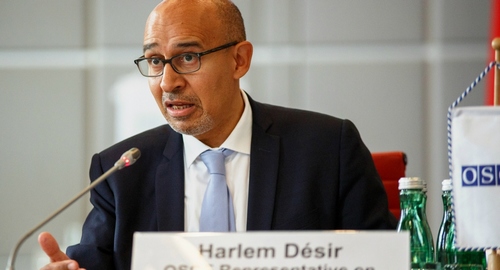Governments must take all steps necessary to fully investigate and end impunity for murders of journalists, says OSCE media freedom representative
The OSCE Representative on Freedom of the Media Harlem Désir opened the panel discussion on the challenges to media freedom caused by the impunity for murders of journalists, on December 11th.

Harlem Désir, OSCE Representative on Freedom of the Media , speaking at the opening of the Internet Freedom Conference, 13 October 2017, Vienna.
“In around 85 percent of cases concerning killing of journalists in the OSCE region, the perpetrators and masterminds remain unpunished. This is a shameful truth that requires action,” the Representative said in his opening remarks. “Impunity leads to self-censorship and breeds further violence. Governments must step up their efforts to fully investigate and end impunity for murders of journalists.”
The event was organized by the Office of the OSCE Representative on Freedom of the Media in co-operation with the Media Governance and Industries Research Lab at the Department of Communication of the University of Vienna.
“One murdered journalist is one too many: As a global society we must mobilize all our forces to assess the true cost for a free press. Caring about democracy and human rights means caring about free and fearless journalism. We are here to help cement the foundations of democracy by strengthening international efforts for the protection of journalists and for people’s right to the facts,” said Katharine Sarikakis, Professor of Media Industries, Media Organisation and Media Governance at the University of Vienna.
A keynote speech was delivered by Paul Caruana Galizia together with his brothers Matthew and Andrew Caruana Galizia, sons of the Maltese journalist Daphne Caruana Galizia, who was assassinated in October.
Désir said: “Ending impunity is an absolute imperative for me as the OSCE Representative on Freedom of the Media. I reiterate my call on all OSCE participating States to take all steps necessary to fully investigate all crimes committed against media workers. This is essential for the effective functioning of our democracies.”
The meeting gathered around 100 participants, including experts from across the OSCE region to discuss the practical, methodological and ethical aspects of monitoring the deaths of journalists and collecting information on such cases. Ways to improve and amend current practices in the OSCE region to enhance journalists’ safety were also discussed. Among the experts were representatives from the Council of Europe, UNESCO, Reporters without Borders, the International Federation of Journalists, the European Federation of Journalists, the Association of European Journalists, Article 19, and the Index on Censorship.
Source: Organization for Security and Co-operation in Europe
- 179 reads
Human Rights
Ringing FOWPAL’s Peace Bell for the World:Nobel Peace Prize Laureates’ Visions and Actions

Protecting the World’s Cultural Diversity for a Sustainable Future

The Peace Bell Resonates at the 27th Eurasian Economic Summit

Declaration of World Day of the Power of Hope Endorsed by People in 158 Nations

Puppet Show I International Friendship Day 2020

